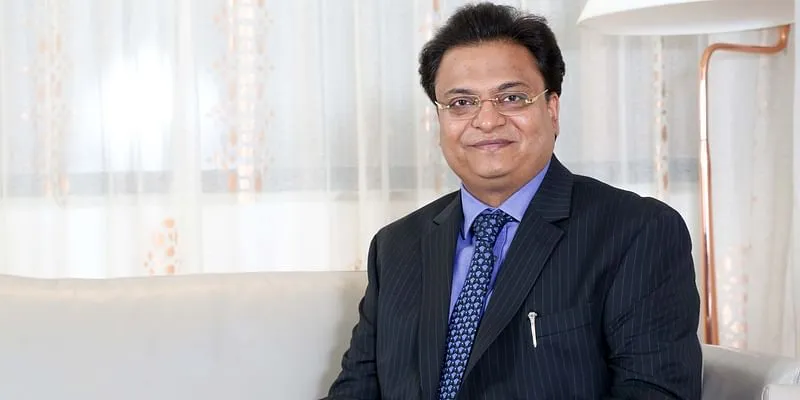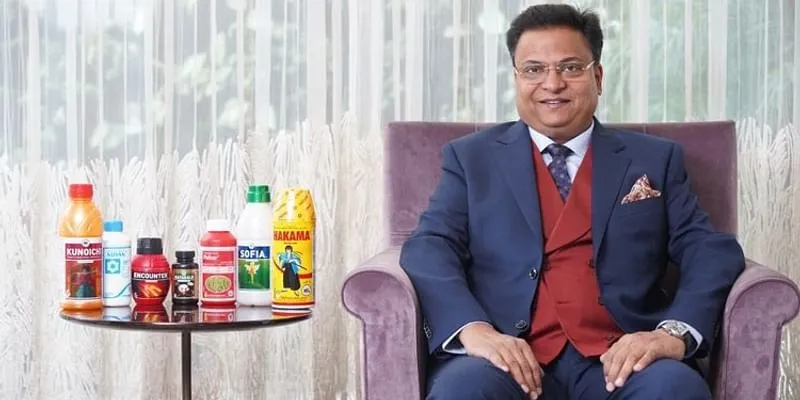This third-generation entrepreneur moved away from family business to build a Rs 1,190 Cr agrochemical company
Here’s how Rajesh Aggarwal, along with his father, built Insecticides India Limited to uplift farmers by providing a wide range of insecticides, herbicides, fungicides, and PGRs. The company got listed on the NSE & BSE in 2007.

Rajesh Aggarwal, Managing Director, Insecticides India Limited
India is one of the largest exporters of agricultural produce. The country exports wheat, rice, sugar, tea, and many other products across the globe.
The latest locust attack in Jaipur has left farmers perturbed for their crops. This can be dreadful for the farming community, especially at a time when the world is already fighting against COVID-19.
However, for any country to remain significant in its agricultural activities, it has to focus and invest in the agrochemicals sector, besides educating the farmers on scientific knowledge.
To cater to this segment and with an aim to uplift the farmers and the agricultural produce of India, Rajesh Aggarwal founded Insecticides India Limited in 2001.
In an interaction with SMBStory, he says,
“My father Hari Chand Aggarwal and I founded the company after moving away from the three-generations old business of pulverising mills, with an aim to uplift the farmers by bringing in world-class technology and provide the agricultural sector with the quality agrochemicals.”
Today, IIL is one of the leading agrochemical companies in India, with more than 100 products and over 20 technical grade products that produce a range of insecticides, herbicides, fungicides, PGRs, and is clocking a turnover of Rs 1,192 crore. It also got listed on the National Stock Exchange (NSE) and the Bombay Stock Exchange (BSE) in 2007.
Talking about how the country can overcome with the locus attack that has now reached the National Capital, Rajesh says, IIL manufactures insecticides such as Lethal and Nuvan, which can be sprayed to control the breeding of locusts in the fields.
Edited excerpts from the interview:
SMBStory (SMBS): How did you start Insecticides India Ltd?
Rajesh Aggarwal (RA): IIL began operations in 2001 and started its first formulation plant in Chopanki (Rajasthan) in 2002 with a paid-up capital of Rs two crore. While we incepted the business, we knew that it would take longer to start a brand from scratch, but we were in the interest of saving time. Hence, we acquired an existing company by the name Montari Industries Limited and launched brands like Lethal, Lethal Super, Milchlor, and Milstim in the initial stage.
In 2005, the Chopanki plant received ISO certification, and in the next two years, IIL launched four new products. It also launched soil energiser Kayakalp the following year.
In just five years after starting the company, we signed our first technical collaboration with AMVAC, USA. We went public in 2007, and since 2011, we have made sustained efforts to launch new products and upgrade them as per the farmers’ needs. Today, IIL rakes Rs over 1190 crore turnover annually.
SMBS: How are you investing in the R&D of the chemicals?
RA: We have invested heavily in R&D, and are among the pioneers in India. IIL wants to improve the domestic manufacturing capability of India, and ensure fresh formulations suitable to the needs of farmers are available in the market.
We are currently engaged in different themes at different R&D centers, including new product invention, biological research, reverse engineering, and development of new formulations.
In the field of biologicals, we launched ‘Kayakalp’, a revolutionary natural catalyser for the soil in FY 2017-18. In the next fiscal, we launched six products – Sofia, Hercules, Stroke, Encounter, Athlete, and Aikido, all of which contribute further to the vision of Prime Minister Narendra Modi to double farmers’ income by 2022.

Agrochemicals range by Insecticides India Ltd
SMBS: What is the market size of the sector, and how are you differentiating from the competition?
RA: India ranks fourth in agrochemicals management, with a market value of $4.1 billion, which is estimated to reach $8.1 billion by 2025. The exports market is expected to reach $4.2 billion by that time.
IIL has an efficient supply chain that ensures millions of farmers get what they need. Besides, the CSR arm of the company, IIL Foundation, works continuously to uplift the farmers with the right scientific knowledge, and takes care of their children’s education. Over the years, IIL Foundation has conducted regular farmer education programmes in association with ICAR and IARI, and has adopted many schools and villages.
SMBS: How are you sustaining the challenges in the business?
RA: In India, the current food grain availability is 525 grams per capita per day. According to a report by the Food and Agriculture Organization (FAO), food energy requirements for South Asia will be about 2,700 calories per capita per day by 2025. This is an enormous opportunity for agrochemical companies. Stringent environmental regulations across the world are increasing the cost of developing new products, which delays introducing new products in the market.
The introduction of Pesticide Management Bill (PMB) will create many ground-level delays of coming up with a chemical composition for insecticides, and several revisions must be made for the industry to work together in a hassle-free manner, as we head towards Atmanirbhar Bharat.
SMBS: What are your future prospects?
RA: As we aim to make this earth greener and cleaner through our work, we are working on a product portfolio that will become the first choice for all farmers across the world. We are working on this in all directions aggressively, be it R&D, technical synthesis, or formulations.
We look forward to a bright prospect for the agrochemical industry with the increasing stress on reducing agricultural land. IIL also aims to further enhance its export share in the global market.
Edited by Megha Reddy









-with-the-team.png?mode=crop&crop=faces&ar=1%3A1&format=auto&w=1920&q=75)